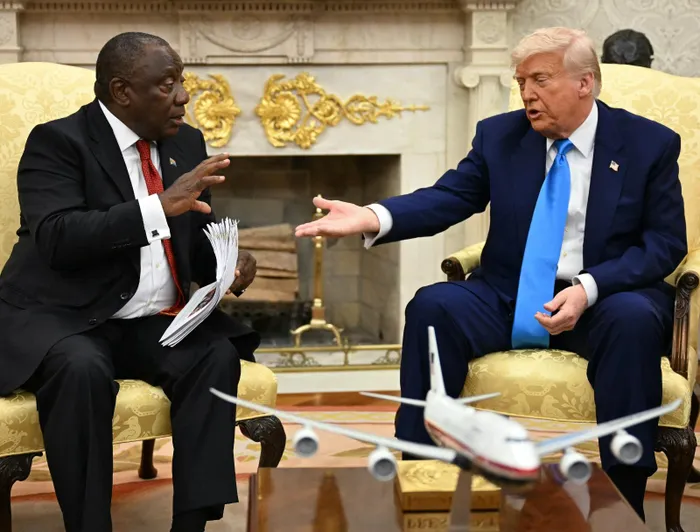Turning the corner: economic reforms, global recognition, and renewed hope
'After years of adversity, South Africa is rebuilding'

South Africa’s hosting of the G20 Summit was under the difficult challenges of the negative stance of US President Donald Trump and the absence of the USA from the Summit. Despite this, President Cyril Ramaphosa and South Africa remained resolute, delivering what many considered the most inclusive and successful G20 to date.
Image: File/ AFP
IN RECENT months, there has been a clear shift in South Africa’s trajectory - driven not by optimism alone, but by significant economic reforms, institutional strengthening, enhanced international standing, and renewed commitments to growth.
On October 24, South Africa was removed from the Financial Action Task Force(FATF) grey list, followed by the Finance Minister’s announcement of a revised 3% inflation target on November 12.
Shortly thereafter, S&P Global Ratings upgradedSouth Africa’s sovereign rating, and between November18 and 23, South Africa successfully hosted the G20 Summit in Johannesburg.
While each of these milestones represents notable progress, their collective impact points to a marked improvement in South Africa’s economic prospects and its standing in the global community.
Together, these mark a meaningful turning point that the ordinary South African can feel hopeful about FATF Greylist Removal South Africa’s exit from the FATF grey list demonstrates the successful implementation of 22 corrective actions to strengthen financial oversight, combat corruption, and enhance transparency.
These reforms have improved investor confidence, increased the country’s appeal for foreign investment, and facilitated easier access to finance for SMEs.
They have also enabled South African banks to restore correspondent relationships with global institutions, streamlining international transactions and reducing costs.
The country’s anti-money laundering and counter-financing of terrorism frameworks now fully meet FATF standards, providing a more stable financial environment for businesses and consumers.
Revised Inflation TargetThe Finance Minister’s announcement of a 3% inflation target, replacing the previous 3% - 6% range, aligns South Africa with international best practices and is expected to support a lower and more credible inflation target.
As a result, lower interest rates are anticipated which would stimulate economic activity.
This will benefit consumers with debt obligations, reduce household expenditure costs, boost the property sector and enhance the investment climate for businesses , ultimately fostering growth and job creation.
The South African Reserve Bank estimates that lower inflation expectations could lead to government savings of approximately R870 billion in interest payments over the next decade.
Credit Rating UpgradeSouth Africa’s improved macroeconomic policy framework and fiscal discipline have been recognised by international rating agencies. Notably, Eskom has posted its first profit in eight years and the Finance Minister’s commitment in the recent MTBPS to stabilising Government Debt at 77.9% of GDP demonstrate significant progress.
As a result, S&P Global Ratings upgraded South Africa’s sovereign credit rating, marking the first such upgrade in over two decades.
Other agencies have echoed this positive sentiment, with further upgrades anticipated in coming months.
This signals to global markets the strengthening of South Africa’s economic fundamentals and effective reforms, enabling the government to secure financing at lower costs and allocate more resources to infrastructure, social services, and employment initiatives.
G20 Summit PresidencySouth Africa’s G20 Presidency - the first for an African country - highlighted its growing international influence.
With the theme “Solidarity, Equality and Sustainability,” the summit focused on reducing borrowing costs for African nations, improving access to development finance, and promoting market access for African exports.
South Africa led initiatives on a just energy transition, local beneficiation of critical minerals, and the expansion of finished goods exports.
South Africa’s Presidency of the G20 and hosting of the G20 Summit was under the difficult challenges of the negative stance of US President Donald Trump and the absence of the USA from the Summit.
Despite this, President Cyril Ramaphosa and South Africa remained resolute, delivering what many considered the most inclusive and successful G20 to date.
The president’s determination to “stand up to bullying” sent a strong message about the Global South’s growing assertiveness and elevated South Africa’s profile as a leading advocate for African and Global South priorities.
As the President stated: "Africa is not looking for handouts or charity. It wants a seat at the table to shape the global economic agenda, foster beneficial partnerships, and reform debt funding to be more equitable.”
South Africa has proven itself to be a credible and note worthy leader, championing both Africa and the Global South.At the parallel B20 Business Summit, attended by global business leaders from sectors including finance, technology, energy, and manufacturing, the sentiment was overwhelmingly positive.
Multinational executives, who I interacted with, expressed admiration for South Africa’s progress, professionalism, and policy reforms, noting the creation of a more predictable and investable environment.
Numerous business investments and trade agreements were signed on the side-lines, ranging from renewable energy projects and digital infrastructure expansion to enhanced manufacturing partnerships.
These agreements are expected to unlock significant capital inflows, generate employment opportunities, and facilitate technology transfer, further strengthening South Africa’s integration into global value chains.
The positive sentiment and tangible commitments generated at the B20 have sent a clear message to the international community that South Africa is fast becoming a preferred destination for sustainable and inclusive investment.
Economic Out look South Africa’s economic outlook is showing visible improvement, evidenced by rising investor confidence, a stabilising currency, and progress in key infrastructure and energy projects. As public finances recover, service delivery is projected to strengthen.
However, persistent challenges such as high unemployment, bureaucratic inefficiencies and corruption remain and the progress achieved is still disrupted by political dynamics.
Conclusion South Africa has turned the corner. There is a palpable sense of optimism as the country embarks on a new economic cycle, grounded in restored credibility, financial stability, and deepening international partnerships.
For ordinary South Africans, this moment is a source of genuine hope, rooted in demonstrable progress rather than empty rhetoric.
After years of adversity, South Africa is rebuilding.
The world is increasingly recognising our country for its achievements, strengths, and potential. As a nation, there is much we must proud of in what has been accomplished.

Ebrahim Patel
Image: SUPPLIED